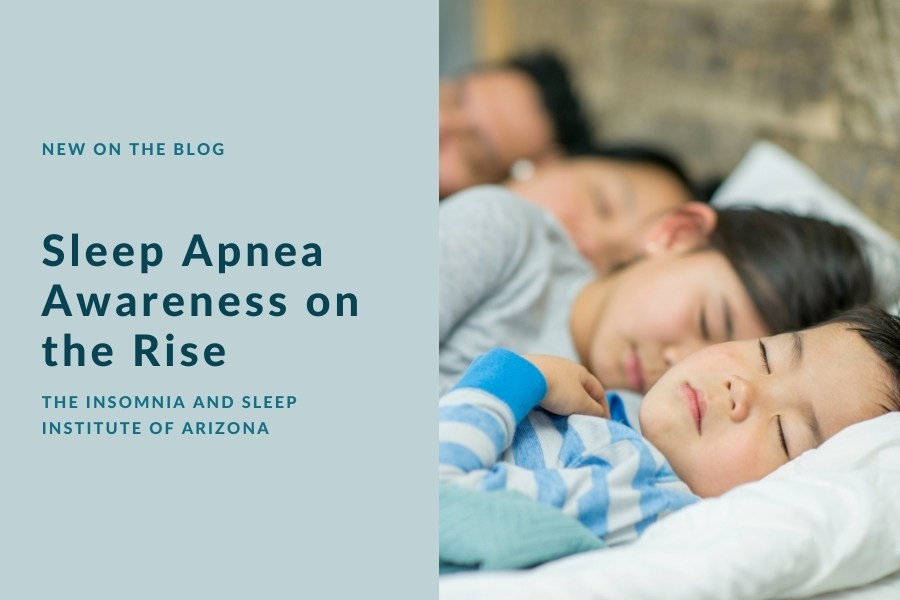The Centers for Disease Control (CDC) just granted the American Academy of Sleep Medicine (AASM) a grant to help raise awareness of obstructive sleep apnea (OSA). This is a project we at The Insomnia and Sleep Institute of Arizona fully support, as OSA is one of the most common—and potentially deadly—of sleep disorders. Millions of Americans struggle with obstructive sleep apnea and, as AASM’s president Raman Malhorta points out, millions more “don’t even know they have sleep apnea.” This puts them at a major risk for a variety of health issues ranging from depression to high blood pressure, stroke, and heart disease.
Malhorta says the grant will “support education and outreach to improve sleep apnea awareness so that people can get the treatment they need to sleep better and enhance their quality of life.” However, awareness is just part of the puzzle. A major obstacle for many who want to get help for their sleep disorders is access to sleep specialists. A lot of the time, a referral from a GP is needed—but that isn’t the case at The Insomnia and Sleep Institute. You can schedule a consultation with a sleep specialist right now without a referral, and your consultant will be a sleep expert who can correctly diagnose sleep disorders like OSA so that testing and treatment can begin.
The Awareness Campaign for OSA
The AASM reports that it is collaborating with a number of other societies such as the National Sleep Foundation and Sleep Apnea Partners for this campaign. They are setting a three-year goal to raise awareness of OSA among public health providers and professionals, as well as the public. This highlights another obstacle in getting OSA correctly managed: lack of understanding even within the medical community. Although common symptoms of OSA include snoring and daytime fatigue (among many others), this isn’t always reported during a typical annual physical. A person who does not regularly share their bed might not know they snore, and of course fatigue can be attributed to a number of factors. If your GP or other health care provider you see on a regular basis isn’t aware of the intricacies of OSA, they may not refer you to a sleep specialist.
The AASM is also supporting the Healthy People 2030 initiative, a 10-year public health plan designed to “increase the proportion of adults with sleep apnea symptoms who get evaluated by a health care provider.” Research shows that just 33.1% of adults aged 20+ with symptoms of OSA actually got a medical evaluation in 2015 and 2016. There are, of course, a multitude of reasons for this with barriers in place in some cases. The AASM stresses that another program focus is going to be tackling disparities in sleep health by working with Black, Native, and Hispanic communities where the cases of OSA are higher than amongst their white counterparts.
Getting OSA Managed
Malhorta says, “This grant will help us improve national awareness efforts, including initiatives supporting racial and ethnic minority populations that have a higher prevalence of sleep apnea. It is important for people to identify the warning signs of sleep apnea and discuss their symptoms with a health care provider.” He is, of course, assuming that in most cases a person cannot directly go to a sleep specialist. This is often the case but, again, not at The Insomnia and Sleep Institute, home to the “Top Doctor” in Phoenix as ranked by peers for the last six years.
The AASM is aware that $327,000 will go far in raising awareness about OSA, preventing unnecessary deaths, improving sleep quality, and minimizing co-morbidities. However, this isn’t the only OSA-based project AASM has been working on. The organization recently developed new clinical practice guidelines for referring adults with OSA for surgical consultations for alternative treatments like the Inspire implant. The guide is available online and is also included as a paper in the Journal of Clinical Sleep Medicine.
When it comes to managing OSA, there are options and help is available. The Insomnia and Sleep Institute is an outcome-driven clinic where diagnoses, testing, and treatment are readily available for those ages 2 – adult. If you have OSA or any sleep disorder, the quicker you schedule a consultation the faster you can enjoy relief. Connect with The Insomnia and Sleep Institute today by calling the office or, for the fastest reply, complete the online form right now.





